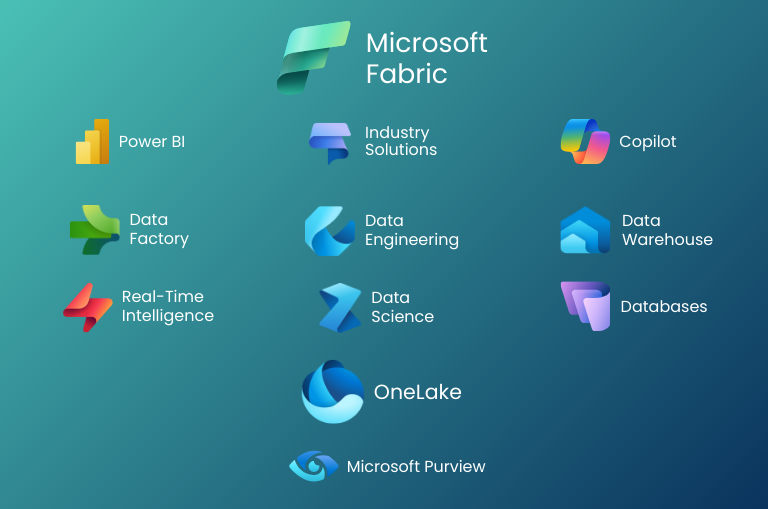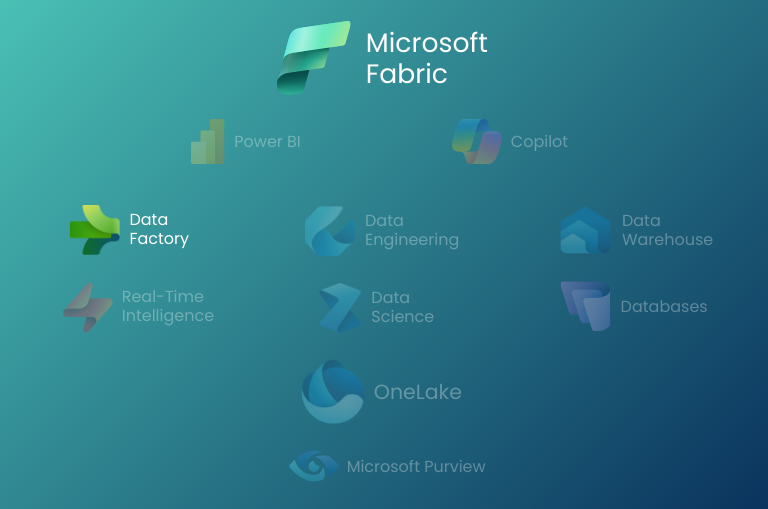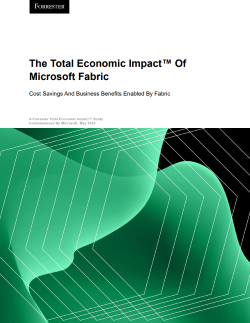What is Data Factory in Microsoft Fabric
The dynamic development of artificial intelligence (AI) has made data the driving force behind innovation and growth for companies in virtually every industry.
Nevertheless, it is people, their skills and creativity that remain key to drawing conclusions and building competitive advantage.
Technology acts as a bridge between these two elements, enabling the connection of dispersed data resources, automation of complex processes, and streamlining decision-making. Thanks to advanced analytical tools and machine learning, business teams can more effectively identify hidden dependencies, forecast trends, and develop new market strategies.
This article discusses how Microsoft Fabric, and especially the Fabric Data Factory service, support this transformation in practice.
What is Microsoft Fabric?
Microsoft Fabric is a comprehensive, integrated data and analytics platform designed for enterprises seeking a simple yet versatile solution for collecting, processing, and analysing information. The platform operates as SaaS (Software as a Service), which ensures ease of use, high scalability, and security.
The key assumption of the platform is the unification of resources and services in one consistent environment. Instead of integrating solutions from various providers, Microsoft Fabric offers a unified technology stack based on Microsoft Azure cloud, which improves the work of both business teams and IT specialists.
Data in Microsoft Fabric is stored in OneLake, a central repository, eliminating the need to use multiple, often dispersed, data stores. This allows companies to manage access more efficiently, maintain data consistency, and ensure regulatory compliance.
Built-in artificial intelligence (AI) mechanisms help better understand data and use it in Microsoft Azure AI Services and specific applications — from real-time reporting to advanced machine learning modelling — available in Microsoft Azure AI Foundry.
One of the most innovative elements of the platform is Microsoft 365 Copilot, an integral part of Fabric. Copilot is an assistant based on generative artificial intelligence (GenAI) that automates routine tasks, fills gaps in expert knowledge, and suggests optimal data operations. As a result, users can create reports, formulate queries, and implement data engineering processes faster without writing complex scripts.
Moreover, Copilot analyses the data context and adjusts suggestions to specific business needs. Consequently, organisations using Microsoft Fabric supported by Microsoft Copilot gain an integrated environment for efficient data integration from diverse sources such as Microsoft Dynamics 365 Sales, designing advanced analytical pipelines, and using machine learning algorithms, as well as ready-made large (LLM) and small models (SLM) in everyday work.
This unified platform significantly reduces administrative costs, speeds up new project implementations in Power Platform and Microsoft Copilot Studio, and effectively supports teams at every level in maximising the potential of information.
What applications are included in Microsoft Fabric?
Microsoft Fabric is a suite of services with broad applications across the entire data processing and analysis cycle. It offers a unified platform where every component plays a key role in the ecosystem.

Thanks to this, companies gain versatile tools for migration, management, and data analysis, as well as for creating innovative AI solutions.
-
- Fabric Data Factory - This is a modern tool for integrating and preparing data from various sources. It allows the automation of ETL/ELT processes, task scheduling, and fast transfer of even gigantic volumes of information to target data warehouses. In addition to a rich library of connectors, Data Factory provides mechanisms functional in AI transformation, such as built-in support for intelligent data flows. Thanks to its simple interface, both experienced programmers and business specialists can quickly create data pipelines without the need to write complicated scripts.
- Fabric Data Engineering - A module created for teams specialising in advanced calculations and data engineering. It offers a Spark cluster-based environment, enabling fast processing of massive datasets and integration with other Fabric components. This fosters the creation of scalable machine learning projects, supported by configurable tools and libraries.
- Fabric Data Warehouse - A high-performance data warehouse designed with scalability and flexibility in mind. It allows the separation of computing resources from storage, enabling users to manage performance and costs independently. It supports the native Delta Lake format and integrates seamlessly with other services.
- Fabric Databases - Facilitate the management of relational and custom data structures in a centralised environment. They allow quick replication of data from various sources and consistent scaling for transactional and analytical applications.
- Fabric Data Science - A module that simplifies the design, training, and deployment of machine learning models. It supports integration with Azure Machine Learning and provides a set of tools that facilitate experiments and model lifecycle management.
- Fabric Real-time Intelligence - Provides instant collection and processing of streaming data, enabling real-time event monitoring and log analysis. This allows companies to respond quickly to dynamically changing business conditions based on current data.
- Fabric Power BI - A well-known and valued tool for visualisation and interactive data analysis. In the Fabric environment, it provides easy access to all resources in OneLake, speeding up the creation of reports and dashboards.
- Copilot in Fabric - Copilot is an AI assistant that supports users in automating tasks related to data transformation, cleaning, and modelling. Its ability to generate suggestions and code significantly accelerates the implementation of new analytical processes and learning how to use the platform.
- Fabric OneLake - A central data repository where all files and tables are collected. Thanks to consistent storage, information can be easily shared across different Fabric moduless and data duplication can be avoided.
- Microsoft Purview - A comprehensive solution for data governance and security. It allows monitoring the flow of information within Fabric and establishing governance and compliance policies.
- Fabric Industry Solutions - Provides dedicated industry-specific data solutions that form a solid foundation for data management, analysis, and key decision-making. These solutions address the specific challenges of different sectors, enabling companies to optimise processes, combine data from many sources, and use advanced analytical tools.
Microsoft Fabric combines all these areas into a unified data platform offering the most versatile platform for big data analysis in the entire industry.
The future and market of ETL/ELT automation tools
Automating ETL (Extract, Transform, Load) and ELT (Extract, Load, Transform) processes in unified data platforms is becoming a key element of modern analytics. These tools enable the integration of data from various sources, its transformation, and loading into data warehouses or data lakes. Thanks to the use of the cloud, artificial intelligence (AI), and real-time processing, the market for these technologies is growing rapidly.
-
Transition from ETL to ELT: ELT allows faster loading of raw data and its transformation in data warehouses.
-
Automation and AI: AI-powered tools accelerate data mapping, cleaning, and predictive transformations.
-
Real-time processing: growing demand for tools supporting streaming data processing.
Statistics illustrating the market potential
- The ETL/ELT tools market will reach $22 billion by 2030, growing at a CAGR of 14.5% (Research and Markets).
- ETL process automation reduces data preparation time by 30-50%, enabling faster analytical results (arXiv).
- 60% of companies plan to implement tools supporting real-time processing by 2026 (Gartner).
- ELT is currently the preferred data integration method in 75% of new cloud projects, thanks to improved performance and lower operating costs (Fivetran).
- Organisations using AI in ETL reduce operating costs by an average of 20% while increasing data accuracy by 15% (arXiv).
The future of ETL/ELT tools is based on automation, AI integration, and real-time processing. Investments in these technologies allow companies to manage data more effectively, which translates into better business decisions and a competitive advantage.
What is Fabric Data Factory?
Fabric Data Factory is a key element of the Microsoft Fabric platform, providing modern and fast integration of data from diverse sources. Its role is to create data pipelines enabling extraction, transformation, and loading of information to target databases or warehouses. Thanks to an intuitive interface and extensive connector library, it allows easy merging of data from cloud SaaS applications or on-premises sources.

Importantly, Data Factory also boasts a rich set of tools supporting AI transformation. It offers built-in support for fast data copies (Fast Copy), facilitating the transfer of large volumes of information with minimal network load. Intelligent activities are also available, such as integration with Copilot, which can generate automatic code suggestions and data modeling recommendations. This allows even those with limited technical experience to build advanced data flows.
One of the most important aspects of Data Factory is its flexibility in handling diverse data formats, from relational SQL databases and CSV files to real-time data streams. Extensive orchestration mechanisms allow for precise management of the schedule and execution logic of individual pipeline stages. Conditional rules, loops, and even integration with other services in the Fabric ecosystem, such as Spark in the Data Engineering or Real-time Intelligence modules, can be defined.
Data Factory also provides insight into the performance of individual processes, providing users with valuable information about potential bottlenecks or areas requiring optimization. Furthermore, thanks to the shared OneLake environment, data is stored centrally, and Purview mechanisms ensure its compliance with security policies.
In the context of AI transformation, Data Factory serves as a universal connector and catalyst, integrating resources, orchestrating processes, and supporting intelligent analytical solutions in an automated manner. This allows enterprises to not only implement AI projects faster but also manage the entire data lifecycle more effectively.
Who is Fabric Data Factory for?
Fabric Data Factory is aimed at large corporations as well as medium and even smaller organisations. Due to its easy-to-use interface, dedicated connectors, and automation capabilities, it works well in the hands of business teams needing quick access to information without advanced programming knowledge. At the same time, it enables professional developers and data engineers to create complex processing operations enriched with conditional logic and integrations with analytical modules.
Data Factory is used by analysts who need to gather data from multiple sources to create comprehensive reports or machine learning models. It is also useful for AI project managers who want to quickly prototype and deploy new concepts in collaboration with Copilot and other Fabric elements. Finally, Data Factory is appreciated by security and compliance specialists as built-in mechanisms, including data flow analysis, facilitate adherence to governance policies.
Thanks to this broad audience, Data Factory becomes a universal tool for data integration, combining ease of use with power and flexibility in implementing complex analytical operations.
How to use Fabric Data Factory in business?
In the business sector, Data Factory acts as a kind of data flow bloodstream delivering companies current and reliable information necessary for decision making. Thanks to numerous native connectors, data from CRM systems and solutions like Dynamics 365 Sales, Customer Insights, Customer Service, and Contact Centre, ERP systems, SaaS applications, or transactional databases, or SharePoint can be integrated instantly. Then, with the support of intuitive ETL/ELT flows, this data is cleaned, transformed, and enriched to be analysed in Power BI, finally available in Microsoft Power Platform or advanced machine learning modules.
Example use cases include automatic generation of daily sales reports, combining customer information from multiple sources to create personalised offers, or forecasting market trends based on historical data. Marketing departments can also use Data Factory to detect patterns in target group behaviour and plan campaigns more effectively, for example, in Microsoft Dynamics 365 Customer Insights. Additionally, integration with Copilot facilitates developing automatic recommendations and analytical scenarios.
As a result, businesses gain synchronised and reliable data supporting decision-making, increasing competitiveness, and contributing to a better understanding of customer needs. Efficient integration and automation enable companies to focus on identifying new growth opportunities, rather than spending time on manual data infrastructure maintenance.
What are the benefits of using Fabric Data Factory?
Above all, Fabric Data Factory accelerates the time to valuable insights, eliminating many tedious ETL/ELT-related tasks. Integrated connectors and an intuitive interface translate into more efficient connection of diverse data sources, improving collaboration across the organisation. Dynamic scaling ensures that even with a significant increase in data volume or complexity of operations, the platform maintains performance and reliability.
Moreover, Data Factory provides visibility into the status and progress of individual data pipelines, facilitating error diagnosis and process improvement. Extensive automation, especially combined with Copilot, reduces the need for manual scripting and allows teams to act faster at the production level.
A significant advantage is full integration with the Microsoft Fabric ecosystem, including OneLake and governance and security mechanisms. This means sensitive data is stored and processed in a controlled environment, yet easily accessible to authorised personnel. As a result, companies can greatly reduce the risk of errors or regulatory non-compliance and focus on delivering value.
What are the benefits of using Fabric Data Factory in a company AI transformation?
AI transformation requires not only appropriate machine learning models but, above all, clean, organised, and real-time accessible data. Thanks to Fabric Data Factory, the entire integration and processing can be organised in one centralised place. This facilitates feeding machine learning algorithms with fresh information and rapid prototyping, which can be scaled to production level if needed.
Using Data Factory, AI teams receive many functionalities enabling automated and intelligent analysis of source data. The ability to create flows supported by Copilot positively affects productivity and eliminates the need for manual coding. This means data science experts can focus on experimenting with models while being confident that data flows to them consistently and is easy to monitor.
Additionally, integration of Data Factory with other Microsoft Fabric services, such as Real-time Intelligence or Data Engineering, enables continuous learning implementation in systems with high change dynamics. As a result, companies gain flexibility and responsiveness crucial for rapid market adaptation and carrying out advanced AI projects without addressing data issues.
How does Data Factory integrate with other Microsoft Fabric modules?
Fabric Data Factory is part of a larger puzzle where every Microsoft Fabric module plays a specific role and collaborates with other components. The platform's open approach means Data Factory can deliver processed data directly to Data Warehouse, where it is stored in an analytics-optimised format. Developers and data scientists can use the Data Engineering module to create advanced Spark workflows or train machine learning models.
When real-time event monitoring is necessary, Data Factory can stream data to Real-time Intelligence, which allows immediate reaction to important changes in the business environment. Integration with Power BI speeds up the creation of clear management dashboards as all data flowing through Data Factory can automatically feed reports and visualisations.
OneLake plays a key role as a centralised data storage location. Thanks to it, no data fragment is duplicated, and Data Factory processes can freely use shared resources. Microsoft Purview ensures proper governance and security rules protecting sensitive data across the ecosystem. As a result, such integration enables companies to obtain a flexible, comprehensive, and automated data processing network, accelerating processes and minimising errors.
Return on investment from implementing the Microsoft Fabric unified data platform

The Forrester report The Total Economic Impact™ Of Microsoft Fabric (TEI) shows that Microsoft Fabric delivers 379% return on investment (ROI) over three years with 9.79 million USD NPV. Analysing a company with revenues of 5 billion USD, Fabric increased data engineer productivity by 25% (1.8 million USD savings), increased business analyst efficiency by 20% (4.8 million USD savings) and generated 3.6 million USD in profits through better decisions.
Infrastructure savings reached 779 thousand USD, and employee retention improved by 8%. The unified platform integrates data engineering, storage, science, and real-time analytics, eliminating silos. The SaaS model and intuitive interface enable data availability across the organisation, supporting data-driven strategies, according to the Forrester TEI study commissioned by Microsoft.
Summary
In today's world, where data forms the basis of nearly every business decision, fast and consistent information flow is key to success.
Microsoft Fabric, including Data Factory, offers an environment where data integration, processing, and analysis become easier than ever.
Implementing Microsoft Fabric and using Data Factory guarantees full automation of repetitive tasks and flexibility in tool selection. Combining with Microsoft Copilot and Microsoft Power BI implementation will lead to creative use of new solutions and rapid prototyping, enabling companies to focus on key activities, discovering new opportunities, and creating added value for customers. Meanwhile, built-in security and data governance mechanisms provide companies with control and regulatory compliance.
As a result, Data Factory becomes not only a platform for data transfer but also a crucial catalyst for innovation and process evolution inside the enterprise. It is a tool that connects various business area,s simplifying daily operations and elevating organisations to a new level in the AI transformation era.

